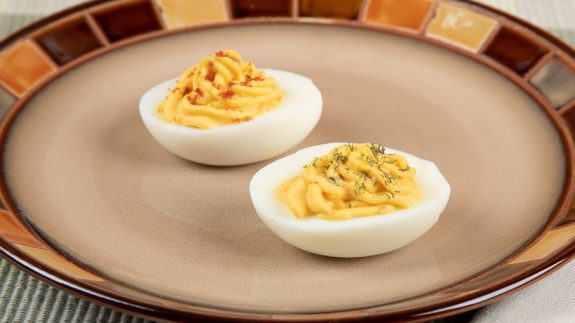Perfect Hard Boiled Eggs
Whether you eat one for breakfast, devil them for appetizers, or color them for Easter hard cooked (boiled) eggs can be soft and delectable or a chewy, rubbery mess.
Chewy, rubbery egg whites indicate overcooked eggs. The usual method is placing eggs in a pan, covering them with cold water and heating the water until boiling. It takes about 5 minutes after the water reaches a boil to harden the yolks of large eggs. But, cooking times can very, and letting eggs cook too long produces the same results as overcooking shrimp, crab, or lobster.
Poaching Eggs
Poaching is a simple method that guarantees perfect hard boiled eggs every time. Poaching takes a few minutes longer, but like poaching shrimp it produces more consistent results and virtually prevents overcooking. To poach eggs:
- Place eggs in a pan large enough to cover the eggs with at least 1-inch (2.5cm) of water. Do not stack eggs, lay them in single layer.
- Fill pan with enough water to cover the eggs with a minimum of 1-inch of water.
- Bring the water to a full boil on high heat. Remove pan from heat, cover, and let large eggs stand for 10 to 12 minutes in the hot water. Adjust time based on egg size on desired texture.
- Approximate Poaching Times
Medium (48g)……7 to 9 minutes
Large (58g)………..10 to 12 minutes
X-large (68g)……..12 to 15 minutes
- To stop the cooking process, transfer eggs to a pan of ice water (about 1 qt./l of water and 12 ice cubes for every 6 eggs) or drain the hot water and place the pan in your sink and fill with cold running water until the eggs have cooled (about 2 minutes). Alternately, you can fill and empty the pan with cold water until the eggs are cool.
- To peel eggs, tap each end on a hard surface, roll egg between your hands or on a hard surface and begin peeling from the large end. The shell should easily come off with a thin membrane. The fresher the egg, the more difficult it can be removing the shell. For recipes like deviled eggs, buy eggs one to 2 weeks in advance. Older eggs peel easier than fresh eggs. Regardless of age, removing the shell from some eggs is more difficult then overs without damaging the white.
- Hard cooked eggs can be refrigerated in the shell for up to one week. Used shelled eggs within 3 days.
Cook’s Tip
For egg salad sandwiches, place the eggs in cold water about 1 minute or in ice water about 30 seconds. The eggs will be easier to peel and still be warm.
Tips About Eggs:
- The harmless by unsightly greenish ring that forms between a hard cooked egg yolk and white is a reaction between sulfur in the egg white and iron in the yolk. It occurs when eggs are cooked too long or at too high a temperature. You can minimize or eliminate the ring by following the above cooking method.
- Egg shells can contain bacteria. Piercing a shell can introduce bacteria into the egg and is not recommended.
- Never microwave an egg in the shell. Steam builds up to quickly during microwave cooking which can cause eggs to explode leaving you with a messy clean-up.
- Very fresh eggs can be difficult to peel. To ensure easily peeled eggs, buy and refrigerate eggs one week to 10 days prior to cooking. This allows the eggs to take in air which helps separate the membrane from the egg.
- Hard cooked eggs are easier to peel when cooled.


